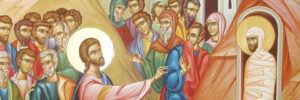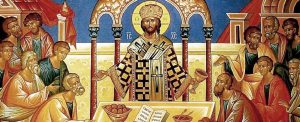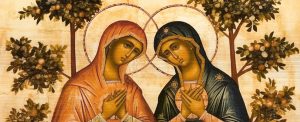Glory to God the Father, the Son, and the Holy Spirit.
This week I was reading the prophecy of Malachi, the last book of the Old Testament, and I saw these words:
From the rising of the sun even to the place where it goes down, my name shall be great among the nations; and in every place incense shall be offered to my name, and a pure offering: for my name shall be great among the nations, says the Lord of Hosts. (Malachi 1:11)
If anyone ever asks why we offer our prayers with incense, point them here: Where else among the nations will you find incense offered up to the name of the Lord of Hosts? Where but in the Church?
When we first started looking into Orthodoxy, we thought lighting up charcoal and incense for prayers was just cool. Right? Admit it! It’s been said that some of us were attracted more by “smells and bells” than by the message of the Cross. And that’s okay; a lot of people followed Jesus because he kept giving them fish and bread, but they heard the Gospel of the Kingdom anyway. And after the resurrection nobody was turned away from baptism because they were first attracted by the food at fellowship hour.
If you ask any of our acolytes serving today in the altar, they can tell you about fire: Fire is hot, it can burn you — and it’s awesome!
Who doesn’t have a memorable story of hair getting set on fire in church, or a trash can full of oily kleenex going up in flames, or a hole burned in the acolyte’s nice gold sticharion…
I can tell you that I burned a big hole in my favorite vestment by folding it on top of the Holy Table – which looks like a wide flat place to arrange holy things, but there’s a burning oil lamp right there. Alas.
* * *
If you were following along in your Bible, last night we sang all of Psalms 1, 2, 3, 103, 140, 141, 116, and 192 (lxx). I know that because half of those are sung every night during Vespers. Ask the person next to you what Psalm 140, verse 2, says, and they’ll likely give you a blank look – but since we sing the Psalms enough to know a lot of them by heart, they’ll recognize it when you sing: “Let my prayer be set forth as incense before Thee; the lifting up of my hands as an evening sacrifice.” In the book of Acts we see the first Christians regularly attending the sacrificial services at the temple, so it’s no surprise that the language of sacrifice and incense is threaded throughout the New Testament.
In the eighth chapter of the Revelation, we read that angels add incense to the prayers of the saints, and it all rises sweetly to the Lord (Tobit 12:11-15). To the mind of early Christians, incense was the smell of the Temple.
Well, incense, burning meat and blood.
All the animals people offered were sacrificed by burning from the third to ninth hours every day. Anywhere near the Temple, your nose would tell you this was a place of burning. And in a culture without detergents or disinfectants, sprinkling blood everywhere made the smell of a Temple a powerful thing.
I expect Saint Paul had this in mind when he wrote,
Thanks be to God who always leads us in triumph in Christ, and through us reveals the fragrance of the knowledge of him in every place. For we are to God the fragrance of Christ among those who are being saved and among those who are perishing. To the one we are the aroma of death leading to death, and to the other the aroma of life leading to life. (2 Corinthians 2:14-16).
In most cultures within a thousand miles of East Africa where the Boswellia tree grows, that tree’s fragrant resin, called frankincense, was burned in prayer. One reason is that cities smelled bad. There was no plumbing or sewers or weekly garbage pickup.
And so cultures found a way to set a place apart: As police today put up a yellow tape to set apart a crime scene – Do not enter! – the fragrance of incense claimed a space, and set it apart from ordinary things. Smell that? You’re entering sacred space. You’re standing on holy ground.
During services a priest or deacon censes the people, the icons on the four walls of the temple, the iconostas and doors – setting apart as sacred, (“hallowing”) the space for the purpose of worship. That’s what Father John has been doing: Before the reading of the Gospel, he marks this as holy ground, these doors, these images, and not incidentally, all of you, the hearers, who are in the image or icon of God. You know how vividly a smell brings back a whole memory and frame of mind. Incense is meant to do that for you here.
In Saint Matthew’s Gospel, we read that the Magi, the Parsee priests from the east, brought gifts to the Savior who was going to be born: Gold, myrrh, and frankincense. Myrrh is a precious anointing, a costly healing medicine; gold and myrrh are fitting gifts for a person of great status and importance. But frankincense is used in prayer by priests. A gift of frankincense says you’re giving a gift to a priest, to a temple – or to a God.
* * *
When I try to explain what the biblical term “the fear of God” means, I compare it to fire. Scripture warns us, “the Lord your God is a consuming fire” (Deuteronomy 4:24; 9:23; Hebrews 12:29) – but nowadays, the furnace and water heater are down in the basement, laundry is all electric, and if you don’t use a gas stove then maybe your kitchen has a ceramic cooktop. So we might go a long time without getting an intuitive understanding of fire.
But power tools, now… You only need a moment’s exposure to a screaming circular saw or a chainsaw or a wood chipper to realize that if you disrespect this thing you will get hurt. A half a minute around power tools, and any sane person will start asking, “How should I hold that? How do I work it without losing a hand or an eye?” That axe or bandsaw is not evil and it’s not out to get you; you just need to know they right way to approach it. You need to know the liturgy of the wood chipper or the roto-tiller.
And so we approach the Consuming Fire, the Lord of Hosts, with respect. And as we think on his words and acts, respect begins to grow into awe and wonder. People like me, who see something funny in everything, have to practice continually guarding their thoughts and words in the temple, because it’s really obvious any time we stop paying attention and start fooling around with the Consuming Fire.
Now I wouldn’t try to say there’s nothing funny about Christianity – but before passing on a joke or video about spiritual things, judge whether you’re laughing at something that’s not funny. You not only endanger yourself; sad experience says you become a temptation to other people. If you know me, you know I’m talking to myself first of all.
* * *
The job every altar server aspires to is maintaining the charcoal in the censer.
The censer has a top and a bottom. The bottom might stand for the earth; the top has a cross that looks like a little Church dome, like the heavens. The space inside is where we live, touching heaven and earth, enclosed in the Church.
This means you and I are the charcoal.
So. First things first: we need to be lit. Obviously an unlit charcoal isn’t good for anything. Maybe less obviously, it’s got to be lit from an outside source. It is significant that one of the most common words for baptism in the early Christian writings is illumination. Of course baptism is about water; it puts us in union with the Lord’s death and burial and resurrection, and throughout the New Testament the language of washing and of rebirth go together. But from observation as well as theology, what baptism does is to set a spark in the kindling, to ignite our dead, dry souls and unite us to the fire of God.
Saint Maximus (in Opuscula 16 and in Ambiguum 7) describes how a steel sword, while it’s being forged in fire, does not cease to be iron, but it begins to participate in the properties of the fire so that it emits light and heat. In the same way, by uniting human and divine natures in his one Person, Christ makes his humanity divine — and we who are in him may likewise become partakers of his divine life and nature (2 Peter 1:4). We do not become God by nature, but we become what Christ is, through the action of Grace.
After baptism, the classic description of growth in Christ is purification, illumination, and union with God.
Purification begins at baptism, when St John the Forerunner promised Christ would baptize us with the Holy Spirit and fire. Purification continues, or it is meant to continue, as we feed that fire. You know what happens if you leave charcoal alone for long: It burns out. An acolyte’s worst nightmare: He’s ignored the censer too long and it’s gone cold, but the priest needs it now. Also, the bishop is here. So, no pressure.
You feed the fire through almsgiving, by doing kindness and humility, by cutting off every unprofitable word and thought, and by practicing the presence of God. That’s why the Jesus Prayer is on the lips of every novice – he or she is setting out on the road of purification and this is breathing on the coals.
(The saints are people who never stopped praying the Prayer; great elders and spiritual giants use the same Jesus prayer you and I use.)
Purification – and illumination. Illumination is being lit up by the Holy Spirit. Like the lamps burning all around us: they give off light an dbeauty that they received from another flame before them. Ever since you were anointed to receive the seal of the gift of the Holy Spirit, God the Paraclete has been in you. But there’s no containing God, and like the sun he shines on you.
Unless, like Adam, you hide yourself from him. Remember the Lord, walking in the garden in the cool of the day, calling for Adam, and Adam hiding rather than running to the Healer and Forgiver. And there we are, in the seconds after opening our eyes in the morning, in the minutes as we prepare to lie down, or when we stand in line at Safeway: Are we practicing the presence of God? Or does he have to keep calling, Adam, where are you?
You know our God is not looking for endless hours on your knees or every page in a prayerbook; he is looking for the one who will look up and give thanks, ask safety and pardon, and spend a moment letting the oxygen of heaven breathe on our soul. “For the eyes of the Lord run to and fro throughout the whole earth, to show himself strong on behalf of the one whose heart belongs to him.” (2 Chronicles 16:9).
The outside source that shines on you and me is God the Holy Spirit, the Giver of life, who blesses, illumines, and unites us increasingly to the life and nature of the Holy Trinity.
There’s a story in the Desert Fathers:
Abba Lot went to see the elder Abba Joseph and said to him, “Abba, as far as I can, I say the daily services. I fast a little. I pray. I meditate. I live in peace, and as far as I can, I purify my thoughts. What else can I do?”
Then the old man stood up, stretched his hands towards heaven and his fingers became like ten lamps of fire, and he said to him, “If you will, you can become all flame.”
From the glimpses I’ve seen in scripture and experience of the goodness of God, that makes me hungry. I don’t know much, but I’ve tasted and seen that the Lord is good, and I want more. The faith and works of the extraordinary, wonderworking saints are beyond me – but they move the needle on my idea of what is possible. I may not raise the dead, but I may be able to fast a little more intentionally, or keep my mouth shut a little more. I may be able to practice the presence of God more than I do. I may be able to receive from the Lord clean hands and a pure heart, which is the only way we can offer them to him. And if it happens that I do any of that, the example of the martyrs and saints keeps me from getting impressed with myself.
* * *
There are a few types of charcoal — or types of Christians.
First, there is the charcoal that gets lit and stays hot for a while, but then cools off from neglect. This is the person who was once on fire for the faith, who lived an active and serious Christian life, But now for one reason or another they find themselves cold. They are probably still showing up to Church, and from the outside might look a good Christian, but they are really just going through the motions.
When that’s me, I need to add fresh fire. The charcoal is still good, it just needs something from outside to heat it back up. If I put another red-hot coal in the censer, they’ll both be hot in a moment.
Ever wondered why we have so many services? 7-Eleven is open all night every night, but there’s no customer who is actually there 24/7. But when you want chips or Slurpees at any hour of the day or night, they are open! When your coal is burning out, the short service of Vespers with a few other folks can help, so the church is open nearly every night. In my experience I have protested about getting out of my chair to go to a service, but I’ve never regretted standing and praying at a service. Most of our prayers are in the plural (Give us our daily bread, and forgive us our debts) because the Church assumes our prayer life is at least in part something we do together.
And outside of the services, how often are we in one another’s homes? Meeting for coffee? Walking the Farmer’s Market together? Volunteering together at the warming center or the school? A charcoal alone cools off and goes out; the strength of kindling is when it shepherds its warmth together.
Here’s a rookie mistake: If the censer lid closes, then the coal smothers itself. If I close myself off from the people who love me, and I dwell on my thoughts, then my fire dies out in my own smoke and darkness. Our inner self-talk is about the government, the economy, the culture, or our own entitlement. It’s their fault, and we’re sure we deserve better. We’re not giving off any light or fragrance now; just pain and echoes.
Open the lid and cense something! The cure for darkness and smoke is to be out and moving. Stop and give something to the Will Work For Food guy, or knock on a friend’s door for no reason and see if they’re okay. Think of anyone who’s done you good, and thank them for it. Light a candle and stand for a few minutes and cry out to the One who’s been in the darkness with you. There’s a river of living water ready to flow through you and refresh and revive you.
And once again we’re mixing metaphors of fire and water. “I am large; I contain multitudes.”
Then there is the charcoal that’s been lit, but because of the priest’s carelessness or lack of attention, it goes flying out of the censer. It burns a spot in the wood – or it makes the most fantastic stink when it lands on a rug. And all the clergy and acolytes go momentarily crazy: Oh no, pick it up, no, can’t pick it up, it’s red-hot, get the tongs, get a spoon, go tell the choir to keep singing for a while, stamp out the red-hot crumbs, nothing to see here, everything is fine in the altar, we’re all fine…
I read about a layman who kept an impressive rule of prayer – he did 3000 Jesus prayers every day, and hundreds of prostrations. Then one day when he stood up to pray, the neighbors’ kids out in the yard were noisy, shouting and laughing as they played. He couldn’t concentrate, and grew frustrated, till he exploded with anger, shouting rage and abuse at them. That’s a man who’s figured out the motions of religion but his heart is not healed. The charcoal went flying out of control and burned others.
I knew a lady (not in this parish!) who was at church a lot and knew a lot of scripture by heart. She also turned every conversation to herself. Whatever you were talking about, she had a reason she couldn’t do that, she couldn’t eat that, or she’d been done wrong by somebody connected to it, or in some other way you’d end up agreeing it was too bad, she deserved better. “The tongue is a fire,” Saint James writes (3:6) and especially when our heart is unhealed and full of complaint and self-love. When something bumps the censer, a coal that burns out of control just causes chaos and hurts people.
Sometimes the coal is burning fine, but somebody dumps a whole spoonful of incense on top. You only need about three grains of incense! If you put a whole pile on top of the coal, it’ll smell sweet for a moment – then it’ll be all smoke and burnt stink.
We’ve all seen when a person becomes Orthodox, and with zeal and sweetness of love for Christ they undertake an enormous prayer rule, buy a thousand-knot prayer rope, read nothing but theology, and fast from foods with the greatest strictness. They don’t know that they need a confessor to reality-check their disciplines, or they think their priest is too soft and modern. So they pile on burdens without wisdom, and the result is not healing for their passions; on the contrary they become frustrated, or proud, or both, and there’s no sweet fragrance to be found. There’s a reason we look with a little suspicion at a doctor who writes prescriptions for himself. We need someone else to help us figure out how much “incense” is enough.
Finally there is the fourth type of charcoal. This is the charcoal every acolyte wants. He has maintained it carefully, it’s perfectly hot when it’s needed in season, he has dropped about three grains of incense beside the coal (that’s the secret!) and the coal stays put in the censer until it’s burned away to nothing but dust and ashes. Nobody else even thinks about this piece of coal, but it sweetens the whole temple.
This is the person who continually offers their whole life to Christ, and who has allowed wisdom to shape all of their decisions. They are filled with love for God and their neighbor, because they know they are a debtor – so they owe forgiveness and hospitality, kindness and mercy to everyone. Together with the company of saints in the parish, this person leads their life in service to God until the end of their days. And at the end, nothing is left: Their passions are burned up, gone and forgotten, their name and memory are a sweet fragrance, and like charcoal they return to the dust from whence they came – and they rise like incense to the welcome of their Master: “Well done, good and faithful servant; enter into the joy of your Lord.” (Matthew 25:23).
To the glory of God the Father, the Son, and the Holy Spirit. Amen.






